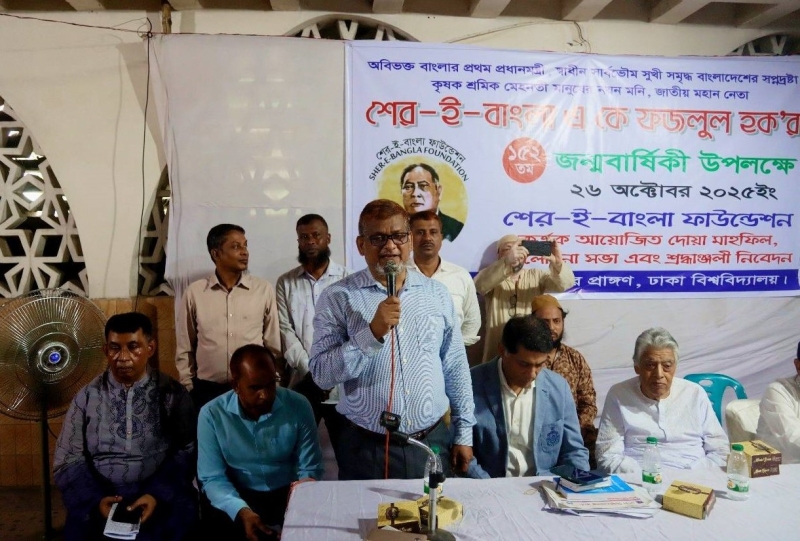- Indices tumble on both bourses amid broad-based sell-off |
- BNP Names 237 Possible Candidates for Polls |
- Bangladeshi leader of disabled people of world Dulal honoured |
- UN Report Warns Inequality Fuels Global Pandemic Vulnerability |
- Trump claims Russia, China secretly conduct underground nuclear tests |
Working for a Transparent Recruitment—SAU VC

Prof. Dr. Md. Abdul Latif Vice Chancellor, Sher-e-Bangla Agricultural University addressing a function arranged on the eve of Sher-e-Bangla A K Fazlul Huq’s birth anniversary
By Prof. M Zahidul Haque
Recently, I had an enriching informal conversation with Professor Dr. Md. Abdul Latif, the Vice Chancellor of Sher-e-Bangla Agricultural University (SAU), Dhaka. During our discussion, he highlighted the ongoing reforms and initiatives being undertaken by his administration to elevate the academic excellence and institutional transparency of this prestigious university.
Professor Latif explained that the university authorities are working tirelessly to enhance the overall educational environment, focusing particularly on ensuring fairness and merit-based recruitment in faculty appointments. When asked about transparency in the teachers’ recruitment process, the Vice Chancellor emphasized that his administration is committed to establishing a fully transparent and accountable system aimed at selecting only the most deserving, competent, and dedicated educators. He elaborated that a comprehensive and structured recruitment mechanism has recently been introduced to ensure neutrality and merit. The procedure now consists of several distinct stages, including a written examination, evaluation of academic records (covering SSC, HSC, BSc/BS, and MSc/MS results), a demonstration of teaching skills through a demo lecture, and a final viva voce. Each of these components carries a specific weight, intended to measure both the academic and pedagogical potential of the candidates. To maintain the utmost fairness and to rule out any possibility of question leakage or malpractice, four faculty members from the relevant discipline, including a subject expert, are assigned to set four separate question papers an hour before the examination. This process is conducted securely at the office-room of the Vice Chancellor. The final exam paper is then created by selecting one question from each of the four sets, ensuring unpredictability and impartiality in the exam process. Professor Latif expressed his firm belief that such a rigorous and transparent system will result in the recruitment of truly qualified teachers who will contribute significantly to academic advancement and institutional development.
When asked about the upcoming undergraduate admission test, the Vice Chancellor confirmed that Sher-e-Bangla Agricultural University will continue to participate in the cluster system for admissions—an integrated framework that unites all public agricultural universities in Bangladesh under a single examination system.
It is worth mentioning that Sher-e-Bangla Agricultural University is the oldest higher educational institution devoted to agricultural sciences in the country.
Established in 1938 by the then Chief Minister of undivided Bengal, Sher-e-Bangla A. K. Fazlul Huq, the institution was originally known as the Bengal Agricultural Institute. Over the decades, it has played a pivotal role in nurturing agricultural education, research, and innovation in Bangladesh. Professor Dr. Md. Abdul Latif, the current Vice Chancellor, reiterated his vision of transforming Sher-e-Bangla Agricultural University into a center of academic and research excellence—a hub that not only produces skilled graduates but also contributes actively to addressing the emerging challenges in the fields of agriculture, environment, and food security.
(Prof. M Zahidul Haque is a regular contributor to the GREENWATCH, Dhaka)

